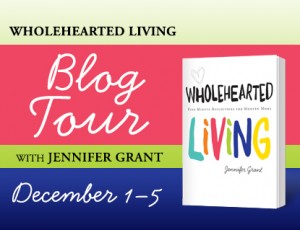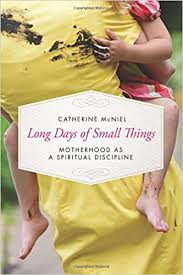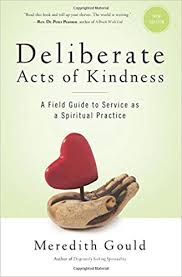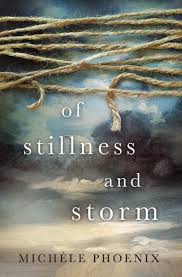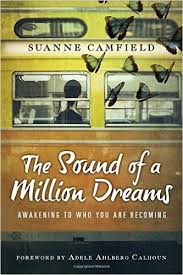The last thing a busy mom needs is another thing to do. But what if adding a wee slice of spiritual self-care to your day becomes the kind of “one more thing” that can help you begin taking other, less important things off of your plate?
My sage friend Jennifer Grant has written a daybook of 365 brief meditations called Wholehearted Living: Five Minute Reflections For Modern Moms (Loyola Press, 2014) that is designed to help you think beyond the daily urgent to what matters most. Here’s what I wrote about the book when she asked me to endorse it: “If you’re stretched for time, stressed by the cacophony of the urgent and immersed up to your eyebrows in the responsibilities of helping to shape your your children’s lives, you’ll find a pause button that will encourage you take a couple of deep, reflective, recalibrating breaths each day in Wholehearted Living. This lovely volume has been written by someone who has lived in the trenches filled with the clatter and joy of everyday family life. Grant’s wisdom and grace will nurture you as you pour your life into nurturing those around you.”
As part of the blog tour for this giftable little volume that is a horse of a different stripe than the standard-issue devotional material targeting moms, I asked Jennifer a few questions about the book, parenting, and the kinds of traps that keep us from being fully present to our families. As you read her answers, you’ll get a sampling of the kind of writing you’ll find in Wholehearted Living.
Q. Where did you get the idea for this book?
A. I was honored when Joseph Durepos, an acquisitions editor at Loyola Press, approached me, asking that I write a daybook for them. After our initial meeting, I spent a few weeks skimming through 365-readings books and beginning the process of developing ideas about what mine might look like.
During that time, I spoke with Jon Sweeney, a trusted friend whom I’ve known since we were fourteen, and told him about the project. Jon’s a prolific author and an editor (I know you are a fan of his work), and he warned me that many writers end up repeating themselves in daybooks. I’m grateful for his word of caution as, from the start, I was focused on keeping the content dynamic and fresh. I certainly didn’t want women to have a sense of déjà vu when they were reading it, asking, in July, “Hey, didn’t she already say this back in March?”
By creating a very specific outline for the book, I believe I was able to avoid being redundant. I wanted the book to have a tight structure and that each day’s reading would be unique and offer something solid, substantive to readers.
Q. So many inspirational books for mothers are filled with “to do’s”: tasks to attempt to make your child’s life more wonderful or things to try in order to become a better parent. Your book takes a refreshingly different approach. From the very first page, where you dedicate the book to the “okay-enough, life-giving moms who need the chance every single day to be honest about the abiding joys and little deaths that attend adulthood, raising children, and finding our place in the world”, you focus on strengthening and honoring mothers. In the midst of the glut of mommy blogs and books doling out advice to stretched-thin parents, you focus on affirming what women are doing rather than telling them what they’re missing. Why this choice? Where did the clarity on this sort of encouragement come from for you in your own parenting journey?
Mothers are bombarded with so much pressure, guilt, and unsolicited—and usually unhelpful—advice about how to raise children. In my two earlier books about family life, as well as in Wholehearted Living, my goal has been to ease that pressure, not add to it.
As you know, each day’s reflection in the book begins with a quote or line of poetry. So, in that spirit, I’ll answer your question by quoting Theodore Roosevelt, who said, “Comparison is the thief of joy.”
It’s a trap when we mothers compare ourselves with others.
We all do things differently.
We all have gifts to offer our kids.
In Wholehearted Living, I write about being a new mom in a mother’s group and learning this lesson, that there’s no need to compare.
I wrote, about the other women in my group, “One woman was an artist whose canvases were filled with painted handprints. She said these were meant to express the joy and mess of family life. Another mother was sort of domestic goddess and knitted her children’s hats and mittens, baked bread, and kept a large vegetable garden. Still another, a social worker, took her kids on regular trips to the arboretum, teaching them to identify trees, birds, and types of clouds.”
As I confessed in the book, I can’t tell the difference between a cumulus and a nimbus, nor can I knit. But as I got to know these women and their children, I started to see that we all had natural gifts that benefited our children. Mine weren’t any better or worse than anyone else’s; they were just different, and mine. There was no need to compare.
Q. You group your meditations around three themes: Reflect, Risk, and Rest. Which one of those words has been the most challenging to you as a mother? Why?
I’m an expert daydreamer, so I’m adept at reflecting and even ruminating.
And I take risks—all self-expression involves risk.
Rest is definitely hardest for me as a mother. There is always more I could be doing with—and for—my kids. There is always another closet to organize or email to answer or project to write. Since becoming a mother, I’m more and more organized, strategic, productive. And that’s not always a good thing, particularly when I forget to rest.
Rest can also be about trust. Resting in the knowledge that we are loved or enough just as we are.
I’ve been working on being a better “rester” over the past few years.
Q. What words would you most like to hear a year from now from someone who has used this book faithfully most every day?
Every Christmas Eve, I watch “It’s a Wonderful Life” as I wrap presents and get ready for the morning. I’m struck—and always crumple into tears—quite early on in the movie when Clarence, after being asked to go down to earth to help George Bailey, asks, “Is he sick?” and the other angel says, “No. Worse. He’s discouraged.”
That resonates with me; discouragement is the worst.
We bear a lot of disappointment, uncertainty, and discouragement as mothers. And we often bear these things very privately. If Wholehearted Living is an encouragement to women, I’ll be happy.

